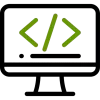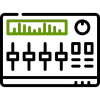8 min read Best Programming Language for AI & Blockchain

Blockchain technology has revolutionized the digital landscape, enabling secure and transparent transactions across a decentralized network. As a result, blockchain development has gained immense prominence, attracting developers with a diverse range of programming languages. But which programming language is the most suitable for blockchain projects?
Here's a breakdown of the top programming languages for blockchain development:
- Solidity: The official language for developing smart contracts on the Ethereum blockchain, Solidity is widely used for creating decentralized applications (DApps).
- Python: A versatile and widely used language, Python is well-suited for blockchain development due to its extensive libraries and frameworks, such as PyChain and BlockCYPHER.
- Java: A popular choice for enterprise-level blockchain development, Java offers scalability and security, making it ideal for large-scale projects.
- JavaScript: A powerful language for web development, JavaScript can be used to interact with blockchain applications and build user interfaces for DApps.
- C++: Known for its efficiency and performance, C++ is often used for developing core blockchain infrastructure and consensus algorithms.
In other-side artificial intelligence (AI) continues to evolve and permeate various industries, the demand for skilled AI developers has skyrocketed. Choosing the right programming language for AI projects is crucial for ensuring efficiency, scalability, and compatibility with various AI frameworks and libraries.
Here's a curated list of the top programming languages for AI development:
- Python: A popular choice for AI enthusiasts, Python offers a vast ecosystem of libraries and frameworks, including TensorFlow, PyTorch, and Scikit-learn.
- R: Primarily used for statistical analysis and data science, R has gained traction in AI due to its powerful statistical modeling capabilities and extensive libraries.
- Java: A versatile language with extensive support for object-oriented programming, Java is well-suited for developing AI applications with complex algorithms and large datasets.
- Scala: A functional language that combines the best of Java and Lisp, Scala is gaining popularity for developing AI systems that require high performance and scalability.
- Julia: A modern language designed for numerical computing, Julia is gaining attention for its speed, flexibility, and ability to handle large-scale data sets.







